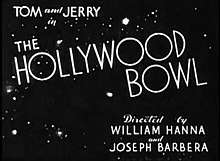Tom and Jerry in the Hollywood Bowl
| Tom and Jerry in the Hollywood Bowl | |
|---|---|
| Tom and Jerry series | |
 The original title card of this cartoon. The title card used in the reissued version looks nearly the same as this, except it is on a blue background. | |
| Directed by |
William Hanna Joseph Barbera |
| Produced by | Fred Quimby |
| Story by |
William Hanna Joseph Barbera |
| Music by |
Musical direction: Scott Bradley |
| Animation by |
Kenneth Muse Irven Spence Ray Patterson Ed Barge |
| Studio | MGM Cartoons |
| Distributed by | Metro-Goldwyn-Mayer |
| Release date(s) |
September 16, 1950 December 20, 1957 (re-release) |
| Color process |
Technicolor Perspecta (reissued in 1957) |
| Running time | 7:22 |
| Preceded by | Safety Second |
| Followed by | The Framed Cat |
Tom and Jerry in the Hollywood Bowl is a 1950 American one-reel animated cartoon and is the 52nd Tom and Jerry short directed by William Hanna and Joseph Barbera and produced by Fred Quimby. The cartoon, as the title suggests, is set at the Hollywood Bowl in California, where Tom is conducting a large orchestra. The cartoon was animated by Kenneth Muse, Irven Spence, Ray Patterson and Ed Barge. It was released to theatres in September 16, 1950 and reissued on December 20, 1957. The music was scored by Scott Bradley, making use of Johann Strauss II's Overture of "Die Fledermaus," with intro and outro making use of Franz Liszt's Les préludes.
Plot
Tom walks onto the stage, ready to conduct a cat orchestra to the overture to "Die Fledermaus." Jerry emerges from his mouse hole and rushes to the podium to try to take over from Tom. Tom tries to whack Jerry with his baton, but Jerry continues to conduct the music from Tom's baton. Tom then stuffs Jerry into his suit, but Jerry pops out from Tom's sleeves. After Jerry pops out of Tom's dickie, Tom stretches Jerry on his baton and catapults him onto a harp. Jerry then offers to dance the Du und du with Tom. After they dance together, Jerry sends Tom spinning into a cello, where he is "strung" by the cello player. Tom then gets his revenge and tricks Jerry into dancing with him before walloping Jerry and hurling him into a sousaphone, where he is "squirted" by the sousaphone player.
Tom and Jerry continue to try to one-up the other and win the right to conduct the orchestra. When Jerry pleads Tom to let him conduct the orchestra, Tom uses his baton as a snooker cue to knock Jerry off the podium before using Jerry's baton as a toothpick and throwing it away. Jerry retaliates by snapping Tom's baton in half, only for Tom to produce a spare baton from his pocket and stick his tongue at Jerry. Jerry, fed up, uses a hammer to put nails into some wheels onto the podium and pushes it (with Tom still on it) out of the amphitheatre and onto the road, where an unaware Tom is flattened by a passing bus.
Tom, returning with his suit ripped and his eyes blackened, grabs Jerry and dangles him between two cymbals, which are bashed together, flattening Jerry. A flat and almost transparent Jerry floats down to the floor and pops back to his full size and structure. Enraged and deciding to sabotage the concert, Jerry grabs a saw and saws underneath the floor of the entire orchestra, causing the feline members of the orchestra to fall and disappear under the floor. Tom is left aimlessly running around to play the instruments until Jerry finishes conducting the symphony. As expected, Jerry takes all applause and credit for himself, and then points to the "One-man orchestra" Tom, who is now exhausted. Then Tom manages to stand up and nod to the crowd before he also falls off through the floor like the feline orchestra.
Production
- Directed by William Hanna and Joseph Barbera
- Animation: Kenneth Muse, Irven Spence, Ray Patterson, Ed Barge
- Story: William Hanna and Joseph Barbera
- Layout: Dick Bickenbach
- Music: Scott Bradley
- Produced by: Fred Quimby
Availability
DVD
- Tom and Jerry Spotlight Collection Vol. 1, Disc Two